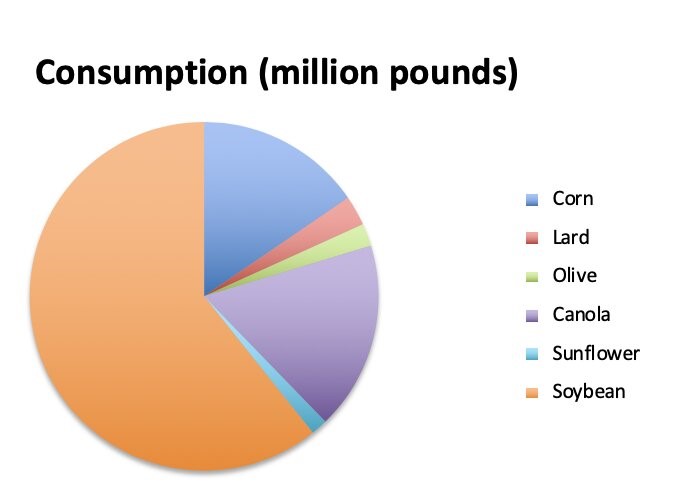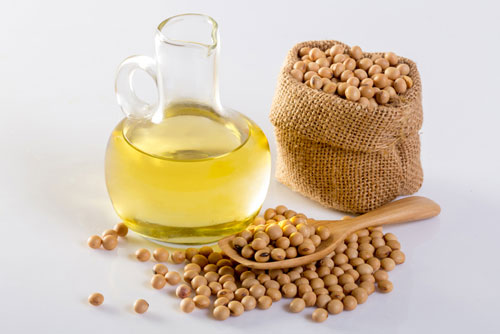When it comes to food oils, we have a confusing array of choices when we go to the grocery store.
Olive oil… corn oil… canola oil… peanut oil… soybean oil… sunflower oil… safflower oil…and many others.
Which ones should you be eating?
A new study shows that the most widely consumed oil may also be the unhealthiest.[i]
In 2015, researchers from the University of California, Riverside gave mice soybean oil. They found it induced obesity, fatty liver disease, diabetes, and insulin resistance in the rodents.
In the new study, the same team compared the effects of soybean oil, a modified version of soybean oil, and coconut oil on mice.
They discovered even more bad news.
Both types of soybean oil had troubling effects on the hypothalamus. That’s a part of the brain that regulates your weight and maintains body temperature. It’s also critical for physical growth, reproduction, and stress response.
The researchers found that soybean oil affects about 100 genes that affect brain functioning and the risk for brain diseases such as Parkinson’s, Alzheimer’s, and autism.
As you can see from pie chart below, soybean oil is the most widely consumed oil in the U.S. by far. Canola is a distant second, followed by corn oil.

Edible fats and oils consumed in the U.S., 2017/2018. Credit: USDA
Soybean oil is used in processed foods and for frying. Margarine is often made from soybean oil.
Dr. Poonamjot Deol was the study’s first author. He said that the common belief that “saturated fat is bad and unsaturated fat is good” isn’t accurate. “Soybean oil is a polyunsaturated fat, but the idea that it’s good for you is not proven.”[ii]
Dr. Deol said that the message he wants people to take from his research is to “reduce consumption of soybean oil.”
The Two Healthiest Oils
If you should avoid soybean oil, what oils are OK?
Here are two that have plenty of science showing they are healthy:
- Avocado oil is rich in heart-healthy oleic acid. Research shows it lowers blood pressure, triglycerides, and LDL cholesterol.[iii] [iv]
You can use it on salads, add it to smoothies, or use it to make homemade mayonnaise. It’s also a great cooking oil because its fatty acids remain stable at high heat.
- Olive oil has been shown to fight virtually every major illness. Studies have found it protects against heart disease, cancer, Alzheimer’s, stroke, diabetes, obesity, and arthritis.[v]
But not all olive oils are created equal. You have to buy the right one to get the most health benefits.
Look for the letters DOP, DO, DOC, and PDO on the label of imported oils. They are universally trusted European certificates of quality and origin. If your oil is from California, make sure it has a COOC seal (California Olive Oil Council) and a USDA organic certification.
Some unscrupulous companies cut their olive oil with cheaper, less healthy oils—like soybean or sunflower oils. These letters help ensure that you’re not buying counterfeit oil.
Buy organic extra virgin oil. And make sure it’s in a dark glass bottle or a steel container. Clear bottles expose oil to light. Light leads to oxidation and rancidity. Plastic containers can leach noxious substances, such as PVCs, into the oil.[vi]
There’s no need to risk your health with soybean oil when these much healthier options are available.
Editor’s Note: Discover the most effective natural methods to improve your health. Read our monthly journal, Independent Healing. It’s your best source for unbiased, evidence-based medical information you won’t find anywhere else. To find out more, go HERE.
Related Articles
Study Reveals How Olive Oil Stops Alzheimer’s
6 Ways to Maximize Olive Oil Health Benefits
One Avocado has a Surprising Effect on Your Brain
Like this Article? Forward this article here or Share on Facebook.
[i]https://academic.oup.com/endo/advance-article/doi/10.1210/endocr/bqz044/5698148
[ii]https://medicalxpress.com/news/2020-01-america-widely-consumed-oil-genetic.html
[iii]https://www.ncbi.nlm.nih.gov/pubmed/15814269
[iv]https://www.oliveoiltimes.com/olive-oil-health-benefits
[v]https://authoritynutrition.com/11-proven-benefits-of-olive-oil/
[vi]https://www.oliveoilsource.com/page/keeping-olive-oil-fresh

